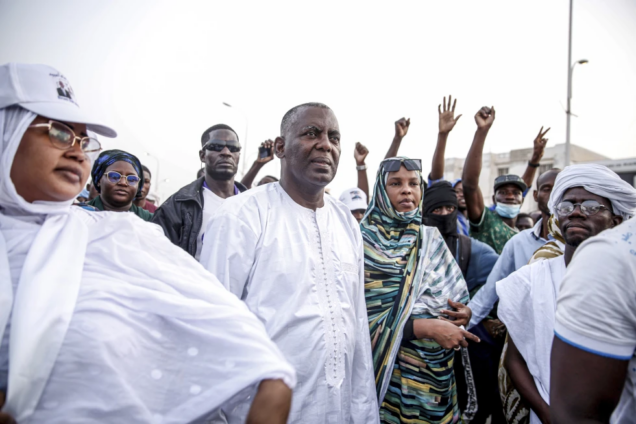Clashes in Mauritania between security forces and protesters rallying against the reelection of President Mohamed Ould Ghazouani left three people dead, authorities said Tuesday. An unspecified number of people were reported injured.
Following the clashes, mobile internet access was blocked Tuesday as authorities vowed to arrest those behind the violence.
The protests broke out late Monday in parts of the northwestern African country after Ghazouani was declared the winner of the presidential election.
His main rival, Biram Dah Abeid, a renowned anti-slavery activist, rejected the outcome and claimed the result was falsified.
Authorities said security forces in the southern city of Kaedi — the country’s largest and an opposition stronghold with an overwhelming Black majority — confronted the demonstrators, the Ministry of Interior said, and several arrests were made. The ministry did not identify the three people killed in the violence or elaborate on the circumstances of their deaths.
Demonstrations also broke out in the towns of Nouadhibou, Rosso Zoueirat and Boghe, all also Abeid strongholds.

“Kaedi last night saw violent acts of vandalism and sabotage of public and private property, scenes of looting and a general climate of fear which led the security forces to confront it and arrest several demonstrators,” the ministry said in a statement.
“The prosecutor’s office will open an investigation to determine the circumstances of these events and the death of the demonstrators,” the ministry added.
Ghazouani, who had campaigned on a pledge of providing security and economic growth, won 56% of the votes while Abeid received 22%, the electoral commission said Monday. Abeid promptly called for “peaceful demonstrations and peaceful gatherings.”
The commission — which includes representatives of political parties — dismissed the opposition's claims about voting irregularities.
Three international election observation missions also said in their preliminary statements Monday that the voting was held in a “peaceful and transparent atmosphere.”
Ghazouani has been accused by his opponents of corruption and mismanagement but remains popular among Mauritanians who see him as a beacon of stability amid regional tensions, with several neighbouring countries shaken by military coups and jihadi violence.
For centuries, Mauritania’s economic and political elite of Arab and Amazigh people enslaved Black people from the northwestern Sahara.
Mauritania outlawed slavery in 1981, the last country in the world to do so, but the practice continues, human rights groups say.
There are around 149,000 people held in conditions of slavery in this nation of less than 5 million, according to the 2023 Global Slavery Index.
Latest Stories
-
Pentagon fires intelligence agency chief after Iran attack assessment
1 hour -
Prof. Bokpin calls for education and regulation on use of academic titles
2 hours -
Prof. Bokpin backs GTEC’s crackdown on use of honorary titles
4 hours -
Third suspect in Immigration Officer’s murder dies – Family says
4 hours -
Give Ghana’s fashion students the tech and software, not just the scissors – CEO of Seloart Group urges
5 hours -
Bryan Acheampong draws anger over ‘tribal campaign’ at NPP meeting
5 hours -
WAEC releases provisional 2025 BECE results
7 hours -
GOIL PLC clinches football trophy at 2025 JoySports Invitational Tournament
7 hours -
Bryan Acheampong condemned for using ‘tribal politics’ against Bawumia’s candidature
7 hours -
Bryan Acheampong highlights northern tribal dynamics that worked against Bawumia, NPP
8 hours -
Ghana and Japan strengthen bilateral business relations with new GIPC-JETRO agreement
8 hours -
Commemorating Ukraine’s Independence Day: A message from Ivan Lukachuk, Chargé d’Affaires of Ukraine in Ghana
8 hours -
Adutwum camp dismisses Global InfoAnalytics poll, claims strong grassroots support in NPP flagbearer race
9 hours -
Discard unfit presidential jet and procure a new one if possible – Prof Gyasi
9 hours -
Fire at Dodowa booster station disrupts water supply to parts of Accra
9 hours

